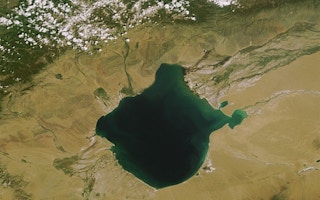The international community should endorse bold moves at the upcoming Rio+20 conference to achieve zero net land degradation, UN Convention to Combat Desertification (UNCCD) Executive Secretary Luc Gnacadja told Xinhua in a recent interview.
“I really look forward to seeing the international community commit itself to a land degradation neutral world,” Gnacadja said.
Twenty years after the 1992 UN Conference on Environment and Development in Rio de Janeiro, where the UNCCD was born, “the time has come for us to set up targets that are measurable and achievable to overcome desertification and land degradation,” he said.
Established in 1994, UNCCD is the first and only legally binding international agreement linking environment and development to sustainable land management.
The Convention’s 194 parties work together, through national action programs that incorporate long-term strategies supported by international cooperation and partnership arrangements, to improve the living conditions for people in drylands, to maintain and restore land and soil productivity, and to mitigate the effects of drought.
Desertification is the persistent degradation of dryland ecosystems by human activities and climatic variations. Because of its toll on human well-being and on the environment, it ranks among the greatest development challenges of our times.
According to Gnacadja, every year, a total of 75 billion tons of fertile soil is lost forever. And every year, due to land degradation and drought, about 12 million hectares of productive land is lost.
However, the implications of desertification on food, water and energy security and even human security are not that well known, Gnacadja said.
He stressed three keywords in the battle against land degradation in related policymaking and actions for the 21st century - namely efficiency, resilience and inclusiveness.
He said the world should use natural capital in an efficient manner, taking into consideration natural resources’ resilience to avoid overexploitation, and promote inclusiveness and synergies among the different stakeholders to tackle land degradation for today’s and future generations.
In the run-up to Rio+20, Gnacadja said the time had come for the international community to commit itself to a land degradation neutral world by setting sustainable development goals on land use, with targets towards achieving zero net land degradation.
Known as Rio+20, the United Nation’s Conference on Sustainable Development will take place in Brazil on June 20-22 to secure renewed political commitment to a green economy that fosters sustainable development.
The UNCCD secretariat has undertaken a series of steps to prepare for Rio+20, starting with a high-level meeting of the UN General Assembly in 2011 on the theme of “Addressing desertification, land degradation and drought in the context of sustainable development and poverty eradication.”
The Convention’s 10th Session of the Parties in South Korea last year also discussed the expectations from the Conference and the UNCCD secretariat made a submission to the preparatory process for the Rio+ 20 Conference, focusing on targets for achieving zero net land degradation.
In order to promote public awareness of the need to combat desertification, Gnacadja said the theme of this year’s World Day to Combat Desertification would be “Healthy soil sustains your life: let’s go land degradation neutral.”
“It means we must take care of the soil’s potential to feed us, to keep the air and water in good quality, and to preserve the forest and beyond, as when the land is degraded we lose all those functions and services. That is why we must go land degradation neutral,” he said.
“We must not only prevent land degradation, but also make sure that every hectare of land that has been unavoidably degraded is offset by land being restored,” he said. “We call on all UNCCD parties and stakeholders to reflect on the theme and take steps forward in implementing the Convention.”
The World Day to Combat Desertification focuses international attention on the growing problem of desertification. It has been observed each year on June 17 since 1995.
The winners of the 2012 Land for Life Award will be disclosed on this year’s day, Gnacadja said, adding UNCCD would give the award to the “21st century heroes who keep the land productive and soil fertile.”
On China’s efforts in containing desertification and reclaiming degraded land, Gnacadja said he witnessed amazing results achieved by both governmental initiatives and private sector endeavors during his visits to China. He said China’s efforts and achievements could provide good examples for many other countries.
“What we need is to take it to the world,” he said. “What has been achieved in China can be used as lessons for others to build their own solutions.”

















